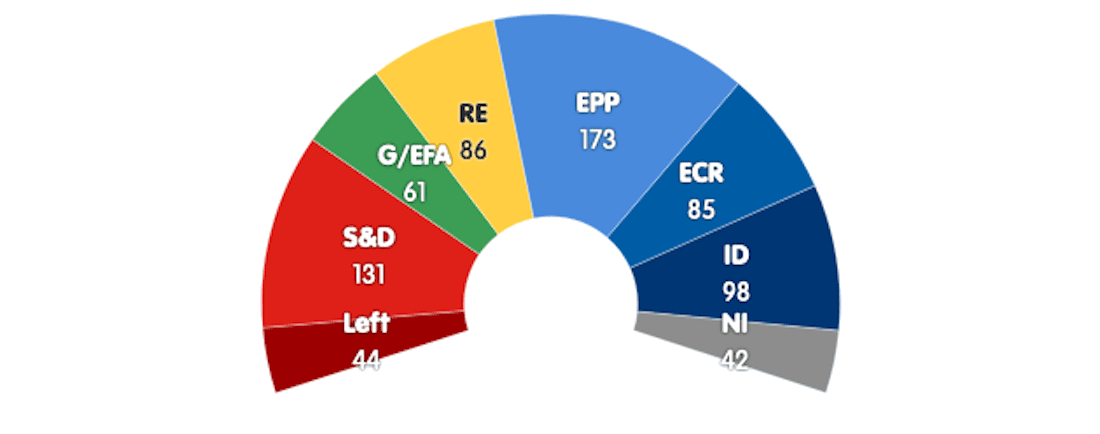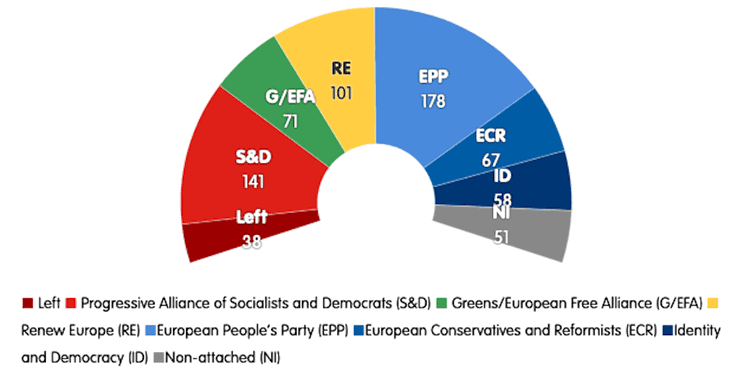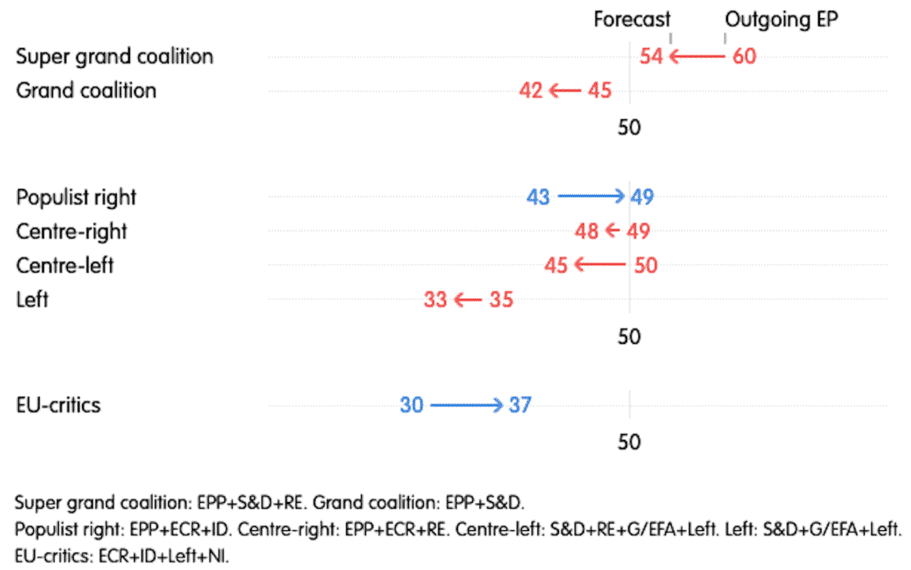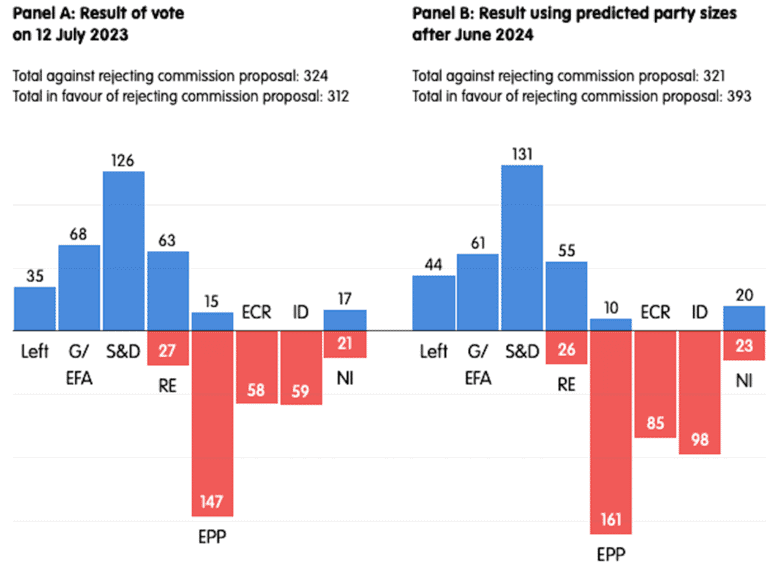Far-right parties are becoming increasingly dominant in national settings across many European Union capitals. Whether in election results, such as the success of Geert Wilders’ Freedom Party (PVV) in the Dutch general election in November, or in their ability to set the agenda from opposition—such as the National Rally’s support for France’s regressive immigration bill in December—the far right played an important role in shaping European politics in 2023. Twenty twenty-four is likely to see a continuation of this trend, not only in national politics but also at the European level, with early polls suggesting a more right-leaning European Parliament will emerge after the June elections.
To determine how significant this shift could be and the effect it could have on the EU’s policies and those of national governments, we collected the most recent opinion polls in every member state and applied a statistical model of the performance of national parties in previous European Parliament elections, building on a model we developed and used for the 2009, 2014 and 2019 elections. The results indicate that the parliament will likely take a sharp turn to the right after June.
Results
Our model predicts the vote share each national party will win in the elections. From those we calculate how many seats each national party is likely to win and how this could affect the political groups in the parliament. Figure 1 shows the number of seats each political group would win in June 2024 if each national party performed as predicted by our statistical model (taking into account that the number of MEPs will increase from 705 to 720 in June).
Figure 1: projected makeup of the European Parliament after June (current makeup below)


The results show that the two main political groups in the parliament—the European People’s Party (EPP) and the Socialists and Democrats (S&D)—will likely continue to lose seats (they have lost seats in the last two elections). This reflects the long-term decline in support for mainstream parties and the growing support for extremist and smaller parties across Europe, which is resulting in an increasing fragmentation of European party systems, at national and European levels.
Despite this, we expect the EPP to remain the largest group in the parliament, and therefore maintain most agenda-setting power, including over the choice of the next president of the European Commission. We predict that the centrist Renew Europe (RE) group and the Greens / European Free Alliance (G/EFA) will also lose seats, falling from 101 to 86 and 71 to 61 respectively. Meanwhile, the Left group should increase its representation from 38 to 44 seats. (If the Five Star Movement in Italy, which we predict will win 13 seats, decided not to sit with the non-attached (NI) MEPs, it could choose to join the G/EFA or the Left, which would bolster the number of MEPs sitting to the left of the S&D.)
But the main winners in the elections will be the populist right. The major winner will be the radical-right Identity and Democracy (ID) group, which we expect to gain 40 seats and, with almost 100 MEPs, to emerge as the third largest group in the new parliament. We also predict that the European Conservatives and Reformists (ECR) will gain 18 seats. And, if Fidesz in Hungary (which we expect to win 14 seats) decides to join the ECR rather than to sit with the non-attached MEPs, the ECR could overtake RE and ID and become the third largest group. We expect the ECR and ID together to account for 25 per cent of MEPs and have more seats combined than the EPP or the S&D for the first time.
Our model predicts significant seat losses for the EPP in Germany, Italy, Romania and Ireland, but significant gains in Spain. We forecast that the S&D will lose a lot of seats in Germany and the Netherlands and will gain most seats in Poland. We expect RE to lose most seats in France and Spain and to make most gains in the Czech Republic and Italy.
We expect the ECR to pick up a lot of seats in Italy, as a result of Brothers of Italy (FdI) emerging as one of the largest delegations in the parliament (with 27 seats). With the expected fall of Forza Italia to only seven seats, though, the EPP might approach Brothers of Italy to join their group. Our model predicts that the ECR will lose seats in Poland, and gain most seats in Romania and Spain, in addition to Italy. It predicts that ID will lose many seats in Italy, with the decline of the Lega, but these losses will be offset by significant gains in France, Germany, the Netherlands, Poland, Portugal, Bulgaria and Austria.
We expect the G/EFA to lose most seats in Germany, France and Italy. Finally, our model predicts that the Left will make most gains in Germany, France and Ireland.
Naturally, there is some uncertainty in these predictions. In addition to the inevitable uncertainty of current polls and our forecast of the likely vote shares and seats for each national party, there is also uncertainty regarding which group some parties will eventually join. There are two types of uncertain parties: those that are not currently represented in the parliament and are not currently members of a European political party (which would automatically determine their group membership) and those that currently have MEPs but might join a different group in the next parliament.
We have already mentioned the three largest parties in this list: Fidesz from Hungary and Brothers of Italy and the Five Star Movement from Italy. Beyond these, there are 25 other parties whose group membership remains uncertain. Together, we predict that these 28 parties will win 122 seats in June 2024, meaning that the eventual sizes of the groups might be somewhat different from those in our forecast.
However, most of the uncertain parties are those that will sit to the right of the EPP, in the ECR, ID or as non-attached MEPs. As a result, our overall forecast about the balance of power in the parliament between the left and right, and the likely sharp right turn, is unlikely to change as a result of changes to these parties’ current or expected group membership.
Coalition patterns
These changes will affect the sizes of the potential coalitions between the political groups in the chamber, which our analysis predicts will benefit the right (Figure 2).
The ‘grand coalition’ of the EPP and the S&D, which lost a majority in the parliament for the first time in 2019, is set to lose seats, holding 42 per cent of the total, compared with its current 45 per cent. Even with the RE group, this ‘super grand coalition’ of the three centrist groups will only hold 54 per cent of the seats, compared with its current 60 per cent. With the average level of voting cohesion within groups in the European Parliament—which means that each group cannot always guarantee all their MEPs will follow the group voting instructions—54 per cent of the seats might not be enough for these three groups to guarantee a winning majority when they vote together.
The left-right balance in the parliament will shift dramatically to the right. According to our model, the left coalition—of the S&D, the G/EFA and the Left—will lose seats, with 33 per cent of the total, compared with the current 35 per cent. And even if the left coalition can secure the support of RE—which it has done on environmental and social-rights issues during the current term—it would hold only 45 per cent of the seats, compared with 50 per cent in the current parliament.
Figure 2: coalition sizes (%)

By contrast, the size of the coalitions on the right is set to increase. A centre-right coalition—of the EPP, RE and ECR—will likely lose some seats, holding 48 per cent instead of the current 49 per cent. However, a ‘populist right coalition’—made up of the EPP, the ECR and ID—will increase its share of the seats from 43 per cent to 49 per cent. In addition, the majority of the non-attached MEPs are from extreme-right parties, meaning that with their support majority coalitions could form to the right of RE for the first time in the history of the parliament. The pivotal MEP in the next parliament is likely to be in the EPP group, rather than in the centrist RE (or previously Liberal) group for the first time.
Finally, our model predicts that the ‘EU critics’ on the radical right and radical left will increase dramatically to hold 37 per cent of the seats, compared with 30 per cent in the current parliament. In short, we expect that populist voices, particularly on the radical right, are likely to be louder after the 2024 elections than at any point since the parliament was first directly elected in 1979.
Policy implications
The changes to the political groups and coalitions will have consequences for the EU’s policy agenda and the direction of future EU legislation. Coalitions on policy issues in the parliament tend not to be the result of formal agreements. Instead, political groups decide how to vote issue by issue. Nevertheless, we can use the voting patterns and winning-coalition sizes in the current parliament to predict how far EU policies might change with the predicted group sizes and balance of power after the 2024 elections.
Based on the analysis of recorded (roll-call) votes in the parliament collected by VoteWatch, different coalitions have tended to dominate in different policy areas in 2019-24:
- A centrist grand coalition (EPP + S&D, usually also with RE) typically won on budgets, budgetary control, culture and education, economic and monetary affairs, foreign affairs, internal market and consumer protection, legal affairs, and transport and tourism.
- A centre + left coalition (S&D + RE+ G/EFA + the Left) usually won on civil liberties and justice and home affairs, development, employment and social affairs, environment, and women’s rights and gender equality.
- A centre + right coalition (EPP + RE + ECR and sometimes ID) usually won on agriculture and rural development, fisheries, industry and research, and international trade.
Our research suggests that in most of these policy areas, these coalitions and winning patterns are likely to continue, at least at the start of the next parliamentary term. For example, on foreign affairs, such as EU support for Ukraine, the majority in the next parliament is likely to back a continuation of the type of financial, logistical and military aid western states have been approving for Kyiv since February 2022. However, there will be a larger number of MEPs (particularly in ID and among the non-attached) who are more sympathetic towards Russia. Furthermore, support for Ukraine in the rest of the parliament might also soften as national parties start to respond to the changing opinions of their voters, expressed by their votes in the European elections.
Nevertheless, our analysis suggests two significant shifts in coalition patterns. First, the smaller size of the centrist grand coalition, even with RE support, is likely to mean it will no longer be as dominant on some policy issues. In particular, on economic and monetary affairs and internal market and consumer protection—where the grand coalition has won votes in the current parliament by smaller margins—we could see a significant shift to the right, as the EPP looks to partners to its right rather than to the S&D.
Given the Euroscepticism of the ECR and ID, and some national parties in the EPP, we could therefore see majorities in the next parliament in support of more economic, fiscal and regulatory freedom for member states. This bloc would be likely to vote against proposals from the commission to enforce common rules and instead side with the growing group of national governments—such as those in Hungary, Italy, Slovakia and Sweden—which are pushing for less interference from Brussels in national economic, fiscal and regulatory policies.
Secondly, the smaller number of MEPs on the left relative to the right means that in several policy areas in which the left has tended to win by small margins a right-wing majority will now be more likely to win than a left-wing majority. This is likely to be particularly true in two areas—civil liberties and justice and home affairs, and the environment—where narrow centre-left majorities may be replaced by a new populist right winning coalition (of EPP + ECR + ID + most non-attached MEPs).
On civil liberties and justice and home affairs, this could have major implications for EU migration and asylum policies, where there is likely to be a majority in the parliament that supports very restrictive immigration policies and will seek to push the commission to reform the EU’s asylum-policy framework to allow more discretion for member states and to limit any sharing of refugee allocations.
This new winning majority on civil liberties and justice and home affairs could also have implications for the EU’s efforts to enforce the rule of law. In the current parliament there has been a narrow majority in favour of the EU imposing sanctions (such as withholding budget payments) on member states in which the rule of law is backsliding—in particular Hungary and Poland. But after June it is likely to be harder for the centrist and centre-left MEPs (in RE, S&D, G/EFA, the Left and parts of the EPP) to hold the line against the continued erosion of democracy, the rule of law and civil liberties in Hungary and any other member state that might head in that direction.
But the biggest policy implications of the 2024 elections are likely to concern environmental policy. In the current parliament, a centre-left coalition (of S&D, RE, G/EFA and the Left) has tended to win on environmental-policy issues, but many of these votes have been won by very small margins. The significant shift to the right in the new parliament will mean that an ‘anti-climate policy action’ coalition is likely to dominate. This would significantly undermine the EU’s Green Deal framework and the adoption and enforcement of common policies to meet the EU’s net-zero targets.
Perhaps the best illustration of this is what would have happened if the key vote on the EU nature-restoration law was held after the 2024 elections. The law forces member states to restore at least 20 per cent of the EU’s land and seas by 2030, with binding targets to restore at least 30 per cent of degraded habitats by 2030, rising to 60 per cent by 2040 and 90 per cent by 2050. The key vote was on July 12th 2023, on a motion by the EPP to reject the commission’s proposal outright. The proposal to reject failed by only 12 votes (312 in favour, 324 against) and the parliament went on to accept the commission’s proposal, with a series of votes against amendments from the groups on the right to water down the proposed actions.
Figure 3: how a key environmental law would have been rejected by the post-2024 parliament

The graphic above shows the breakdown of votes on July 12th and what the outcome would have been had the national parties in each group voted the same way as they did in July but with their projected allocations of MEPs after the elections in June 2024. For example, in July last all eight Brothers of Italy MEPs voted to reject the commission’s proposal, but the party’s seat count is likely to increase to 27 after June. And, on the other side, all 16 German SPD MEPs voted against the rejection, but this representation is likely to be down to only 12 MEPs after June.
Those against rejecting the commission’s proposal won by a small majority of 12 votes in July. However, if the vote had been held with the projected constellations, those in favour of rejecting the proposal would have won by 72 votes (393 votes against the commission’s proposal, to 321 votes in favour). As a result, a key pillar of the Green Deal would have been rejected. The dramatic increase in the number of MEPs to the right of the EPP is likely to seriously limit the EU’s actions to tackle the climate crisis.
A wake-up call
The results of our analysis should serve as a wake-up call for European policy-makers about what is at stake in the June elections. The implications of this vote are far-reaching for the geopolitical direction of the Council of the EU and the commission. The next parliament can be expected to block legislation necessary to implement the politically difficult next phase of the Green Deal—affecting the EU’s climate sovereignty—and push for a harder line on issues key for other areas of EU sovereignty, including migration, enlargement and support for Ukraine. National governments will feel constrained by the way these elections shape domestic debates, affecting the positions they can take in the council. This is likely to bolster the growing axis of governments around the council table attempting to limit the EU’s influence from within: those of Hungary, Italy, Slovakia, Sweden and likely a PVV-led government in the Netherlands.
These findings should also be set against the expectation that whether or not Donald Trump wins the United States presidential election in the autumn—and the polls suggest there is a real possibility he will—Europe will have a less globally engaged US to rely on. This may increase the inclination of anti-establishment and Eurosceptic parties to reject strategic interdependence and a broad range of international partnerships in defence of European interests and values, instead seeking to pursue a more cautious approach to foreign-policy decisions.
Progressive policy-makers need to start considering the trends that are driving these voting patterns and begin preparing narratives that can cut through them. Rather than allowing the discussion of costs and risks in driving forward the green transition, supporting Ukraine or de-risking in international relationships to dominate the debate, they need to craft a clearer message about the economic and security imperatives to do these things, as it is these concerns that are driving voters’ thinking.
They need to recognise the nuances in European citizens’ thinking and compete politically from their own positions of strength with proactive policies, rather than resorting to the fear-driven narratives that the far right is using successfully. For example, on climate, after the supply insecurity brought about by Russia’s war on Ukraine, there is a public will to rely less on fossil fuels. After the drastic weather events affecting many EU countries and reports of worse to come, there is a desire not to lose momentum on climate action. And with the new green-competitiveness framing from the US, there is a will among the business community to embrace green technology—with support from their governments to de-risk supply chains, and with investment and the right regulatory and permitting environment.
Sustaining the ‘hearts and minds’ campaign around green competitiveness as a policy choice for Europe is of course not only about narratives. Policy proposals for a just transition, in which the costs of decarbonisation are evenly shared among all parts of society, need to be more detailed and significantly better funded, including at the European level, and good examples better shared among member states, to support more vulnerable citizens who are fearful and turning towards the far right.
While progressive European leaders cannot, and should not, tell voters what to do, they can build a credible alternative to a sharp right turn in the political mandate given to the next set of EU institutions. From the outset, they need to tell a convincing story about the necessity of reaching outwards in a dangerous world.
This is an abridged version of a policy brief by the authors, published by the European Council on Foreign Relations
